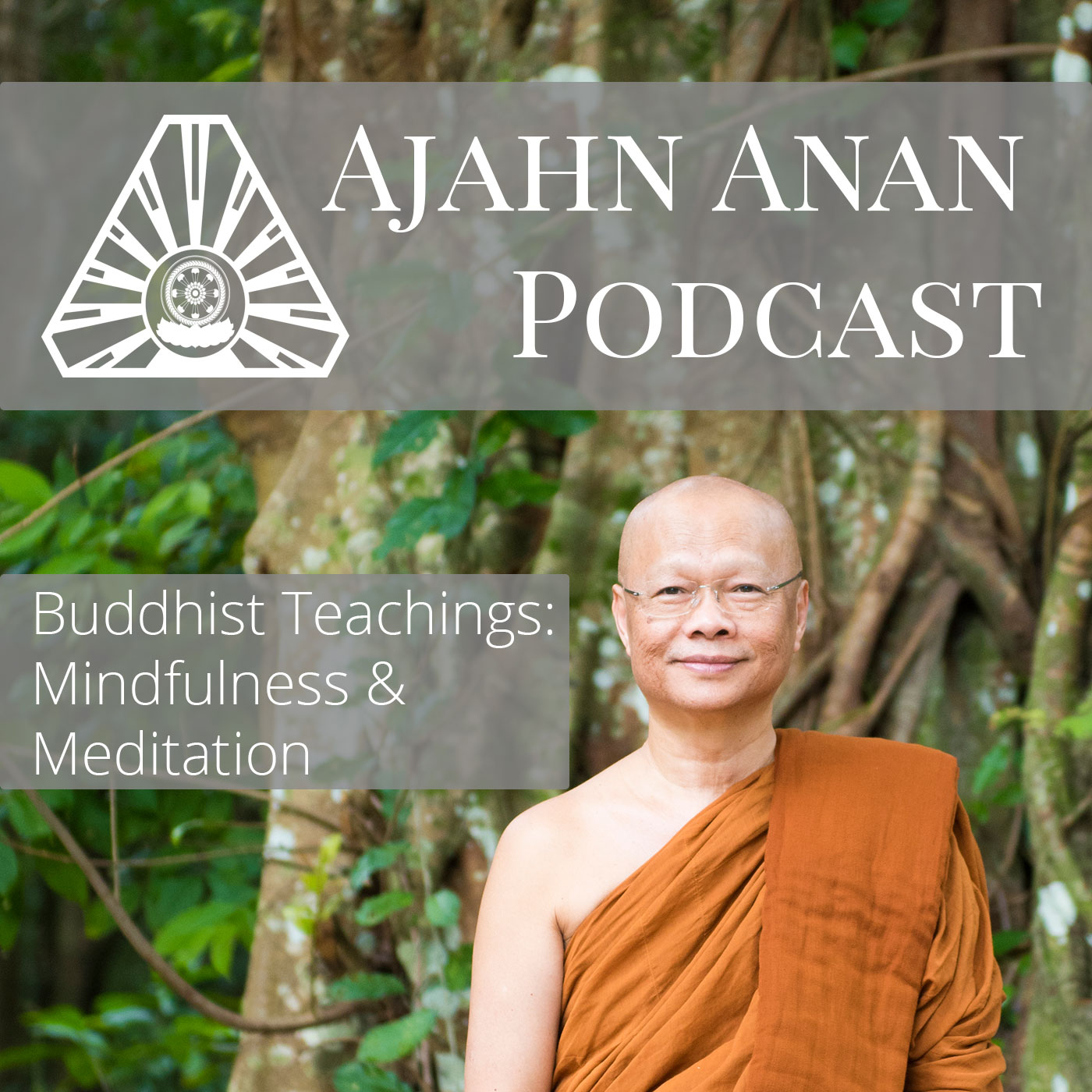
In this videoconference talk from 30 April, 2021, Ajahn Anan discusses the topic of training in discipline, together with a story of venerable Upāli Thera.
“In times of disaster, during this world pandemic, we have to be careful. We have to have the 5 precepts to protect and look after our minds. And when we have sila, this sila will protect us to not fall to a place where we will receive suffering, difficulties and troubles. So we should know that being well-trained in discipline is one of the highest blessings of our life.”

When we see conventional reality as being absolute truth, we’re in trouble. We believe that this body—a collection of protons, neutrons and electrons—is really me. We fixate on labels like male or female, human or animal. All of this causes us endless struggle and distress. It’s when we see that these conventions are mere creations of our minds that we transcend them and discover the happiness of Nibbāna.

When we’ve refined our speech and actions, and learned to settle our minds and gather them inwards, our hearts gain enough energy to see into the truth. By perceiving the nature of ourselves and the world around us, we put down the anger and ignorance that has been burdening us for so long. We are free.

In this talk, Ajahn Anan speaks about how we best teach others by setting an example with our practice, trusting in the path to take us to liberating insight.
To listen to most recent talks, you can visit our YouTube page: https://www.youtube.com/ajahnanan
To join Ajahn Anan and the Wat Marp Jan Community online for daily chanting, meditation, and a Dhamma talk, you can email wmjdhamma@gmail.com for the link. Every day 7-9 p.m. Indochina Time (Bangkok, GMT + 7).

2021.04.06 | We can recollect stories of Lord Buddha or his great disciples, such as Queen Samavati, which can give rise to joy, rapture, and peace. With a mind well-collected we can then clearly see anicca, dukkha, and anatta, cutting through the ties that bind us to suffering. With one foot on the shore of freedom, we keep practising to cut through the ties that bind the mind, in order to realize true freedom, true peace and happiness.
To listen to most recent talks, you can visit our YouTube page: https://www.youtube.com/ajahnanan
To join Ajahn Anan and the Wat Marp Jan Community online for daily chanting, meditation, and a Dhamma talk, you can email wmjdhamma@gmail.com for the link. Daily live sessions at 7pm – 9pm, Indochina Time (Bangkok, GMT+7).

2021.04.04 | It’s natural for Dhamma practitioners to want good things, and only good things. We think we should be good people and have no bad thoughts. The problem is that it’s also natural for us to have bad thoughts. In this talk, Ajahn Anan tells us how we can not allow this to become a source of turmoil for us, and learn to put things down.
To listen to most recent talks, you can visit our YouTube page: https://www.youtube.com/ajahnanan
To join Ajahn Anan and the Wat Marp Jan Community online for daily chanting, meditation, and a Dhamma talk, you can email wmjdhamma@gmail.com for the link. Daily live sessions at 7pm – 9pm, Indochina Time (Bangkok, GMT+7).

In this talk given at the end of the annual rains retreat, Ajahn Anan speaks about the precious opportunity we have as practitioners to develop the heart.
To listen to most recent talks, you can visit our YouTube page: https://www.youtube.com/ajahnanan
To join Ajahn Anan and the Wat Marp Jan Community online for daily chanting, meditation, and a Dhamma talk, you can email wmjdhamma@gmail.com for the link. Live sessions everyday from 7pm to 9pm. Indochina Time (Bangkok, GMT+7).

2021.03.31 | A Dhamma talk given by Ajahn Anan on his Birthday.
To listen to most recent talks, you can visit our YouTube page: https://www.youtube.com/ajahnanan
To join Ajahn Anan and the Wat Marp Jan Community online for daily chanting, meditation, and a Dhamma talk, you can email wmjdhamma@gmail.com for the link. Daily live sessions at 7pm – 9pm, Indochina Time (Bangkok, GMT+7).

In this videoconference talk from 23 April, 2021, Ajahn Anan discusses the topic of humbling and lowering oneself, as well as a story of venerable Maha Kassapa.
“Respect and reverence is being aware of the goodness and virtue of others or of other things. And then one behaves to that person with respect and reverence, mainly shown through one’s body and speech. In regards to humility and lowering oneself, this is being aware of oneself and one is able to behave correctly and appropriately.”

2021.03.31 | The worldly winds come and go, and the mind that clings to them is tossed about in suffering. By seeing clearly and not attaching, the mind realizes peace and true happiness.
To listen to most recent talks, you can visit our YouTube page: https://www.youtube.com/ajahnanan
To join Ajahn Anan and the Wat Marp Jan Community online for daily chanting, meditation, and a Dhamma talk, you can email wmjdhamma@gmail.com for the link. Daily live sessions at 7pm – 9pm, Indochina Time (Bangkok, GMT+7).
